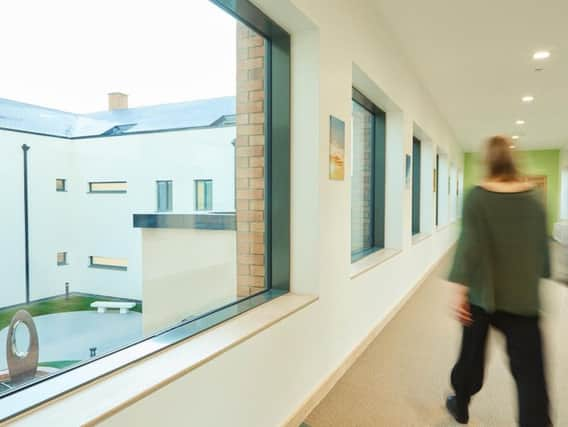Northampton hospital kept patients in seclusion cells for long periods, despite knowing they were low-risk


The Care Quality Commission (CQC) has released the findings of a focused inspection into St Andrew's Healthcare, carried out between October and January.
The watchdog was called in to review the charity's child and adolescent mental health wards after the Chron reported one patient had been kept largely in a secluded 12-ft cell in Fitzroy House, Billing Road, over an 18-month period.
Advertisement
Hide AdAdvertisement
Hide AdFitzroy House is Europe's largest adolescent mental health facility, with space for 110 patients.


Leading clinicians at the charity have now admitted not being able to meet the needs of three patients with 'very complex behaviours and problems' as part of the CQC report.
Inspectors, who spoke to 12 patients as part of their study, said some had been kept in isolation longer than necessary because they were deemed to be a danger to staff - even after presenting as a reduced risk.
The care provider had also not carried out required three-monthly independent reviews of patients in long-term segregation in line with the Mental Health Act code of practice
Advertisement
Hide AdAdvertisement
Hide AdDeputy chief inspector for hospitals, Paul Lelliott, has now ordered St Andrew's to make a "number of improvements".
"This includes ensuring that clinicians independent of the provider are involved in reviews of the care of young people subject to long-term segregation," he said.
"It must also take every step possible to ensure that young people are not being secluded for longer than is strictly necessary."
For all three of the patients with complex needs, St Andrew's had worked to discharge them without success.
Advertisement
Hide AdAdvertisement
Hide AdIn one case, the staff had applied "restrictions" to a patient despite them presenting as a reduced risk. In another, staff had recorded one patient's behaviour as being "settled" over "sustained periods of time" without ending their seclusion.
The watchdog found that the facility was justified in its reasons for placing patients in isolation initially. Staff were also found to treat patients with respect and had drawn up care plans that "reflected the holistic needs of the patient".
The report also found that some workers did not feel fully supported in looking after such complex patients.
Over a three-month period, 57 incidents of staff injury were recorded. These included workers being punched, kicked, scratched, pushed to the floor and being stamped on.
Advertisement
Hide AdAdvertisement
Hide AdDuring one incident, five staff had to attend the A&E department at Northampton General Hospital for injuries to the face, head and stomach.
"Some staff felt the provider did not give them consistent support after incidents," the report added.
"This affected morale, particularly when incidents related to staff assaults."
But St Andrew's bosses have welcomed the findings of the report, which does not change the charity's overall rating of 'requires improvement', handed out in 2017.
Advertisement
Hide AdAdvertisement
Hide AdA spokeswoman said that despite the CQC's concern about the length of some seclusions, the hospital believed it used the practice for the right reasons.
She added: "Staff use recognised techniques to reduce the need for physical restraint wherever possible.
"We are pleased that the CQC noted the lengths our staff go protect patients from avoidable harm, and how they worked in collaboration with patients to develop their care plans and reduce restrictions at the earliest opportunity.
"The CQC also recognised the difficulties providers like St Andrew’s Healthcare face when transitioning patients to community settings more appropriate for their specific needs.
"We will continue to make improvements to our service and look forward to welcoming the CQC back in the future.”